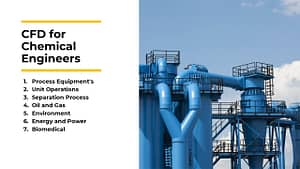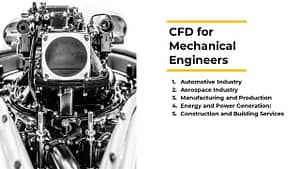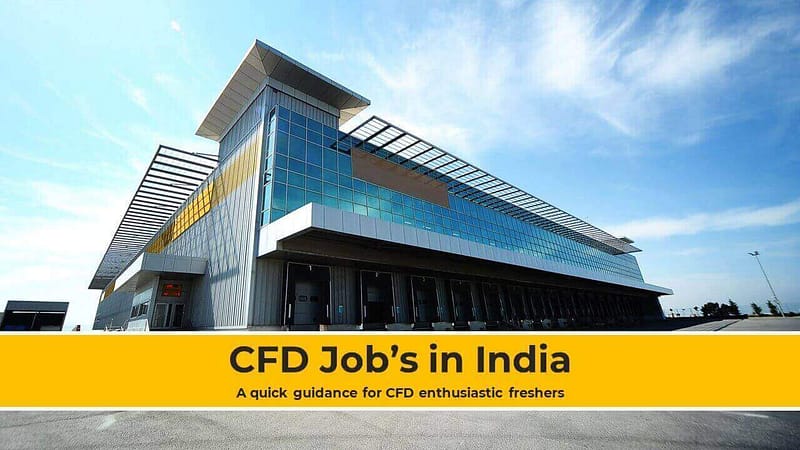Introduction
Computational Fluid Dynamics (CFD) is a dynamic engineering field in India that offers promising career opportunities. In this blog, we’ll provide you with valuable insights into the CFD job landscape, including job prospects, qualifications, and salary expectations in India.
1. General Overview
CFD engineers play a crucial role in various industries by simulating and analyzing fluid and heat transfer phenomena. Their work is essential for optimizing processes, improving product designs, and enhancing efficiency. However, it’s important to note that CFD positions are highly competitive, with a limited number of job openings compared to other engineering roles within companies.
2. Facts for Freshers
Securing a CFD job as a fresher can be quite the challenge due to stiff competition. This competition arises because companies invest significantly in acquiring CFD commercial software licenses and look for candidates with the right qualifications. For instance, in a company with 100 engineers, you might find just 2 or 3 CFD engineers. Many of these firms lean towards experienced candidates with qualifications from esteemed institutions like NITs and IITs. So, if you’re a fresher aiming for a CFD career, it’s essential to focus on gaining relevant experience and qualifications to make yourself stand out in this dynamic field.
3. CFD Jobs for Chemical Engineers
I genuinely believe that chemical engineers are the perfect fit for CFD roles because of their in-depth knowledge of processes and unit operations. In process-based industries, there’s a strong preference for candidates with a background in chemical engineering. Their deep understanding of these industries makes them highly sought-after in the world of CFD. So, if you’re a chemical engineering enthusiast eyeing a CFD career, you’re on the right track to becoming an invaluable asset in the field!

4. CFD Jobs for Mechanical Engineers
When it comes to tackling FEA calculations, mechanical engineers take the spotlight as the preferred candidates. But that’s not all; they also boast a profound understanding of fluid mechanics and heat transfer, making them top choices for projects involving conjugated heat transfer – think electronic cooling, HVAC, and fluid-structure interaction. So, if you’re a mechanical engineering enthusiast eyeing CFD, you’re in for an exciting journey into projects that will truly rev up your engineering gears!

5. CFD Software
The choice of CFD software depends on various factors, including project budget, customer preference, and project nature. Commonly used software for CFD includes ANSYS Fluent, ANSYS CFX, Star CCM, and various pre-processing and post-processing tools. Open-source software like OpenFOAM is gaining popularity for research-oriented projects, while ANSYS Discovery and Fluent, CFX, and Star CCM are preferred for projects with tight timelines and high-quality output requirements.
6. Salary of CFD Engineers in India
Salaries for CFD engineers in India vary based on experience and the complexity of projects they handle. Freshers can expect an annual salary of around 3 to 3.5 LPA (Lakhs Per Annum), while candidates with 3 years of experience may earn between 8 to 12 LPA. Those with 5 to 8 years of experience can command salaries ranging from 12 to 18 LPA.

7. Author’s Experience
Now, let me share a bit of my personal journey in the world of Computational Fluid Dynamics (CFD) to shed some light on what it’s like on the ground.
Back in 2018, I embarked on my CFD career with a modest starting salary of 2.5 Lakhs Per Annum (LPA). I joined a company that would become my home for the next three years. During this time, I encountered several opportunities to jump ship for potentially higher-paying roles. But here’s the catch – I chose to stay put.
You might wonder why I made that decision. Well, I learned that in the realm of CFD, it’s not just about the numbers on your paycheck. Your CFD journey is significantly enriched by the experience you gain and the challenges you tackle along the way.
I had the privilege of working for a manufacturing company, where I was exposed to both real-world industrial problems and the exciting task of solving them using CFD simulation technic. This unique blend of experiences allowed me to bridge the gap between the tangible reality of the factory floor and the abstract world of numerical simulations.
This fusion of real-world scenarios and numerical CFD work gave me an invaluable sense of confidence. I realized that this confidence, earned through practical problem-solving and hands-on experience, was far more precious than a higher package at another company.
In essence, what I’m trying to convey is that CFD isn’t just a job; it’s a journey. It’s about understanding the intricacies of fluid dynamics, heat transfer, and complex processes and then applying that knowledge to real-world challenges. It’s about finding solutions that impact the physical world around us, making processes more efficient, and products more reliable.
So, while the salary figures for CFD engineers in India may vary, remember that the true wealth lies in the experiences gained, the problems solved, and the confidence earned along the way. It’s a field where your skills and knowledge are not just about financial gain but about making a tangible difference in the world. And in my opinion, that’s worth its weight in gold.
Author : Mr. Manish Bhasme | LinkedIn








